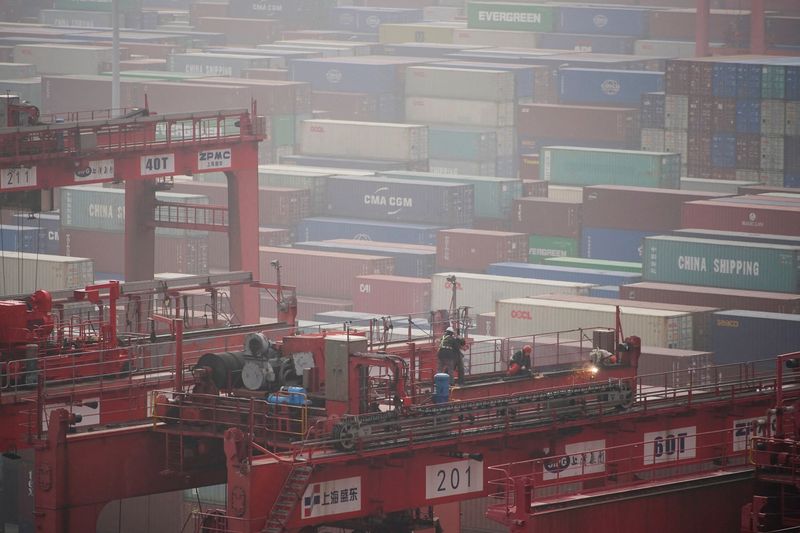BEIJING (Reuters) - China's exports and imports shrank at their steepest pace in at least 2-1/2 years in November, as feeble global and domestic demand, COVID-led production disruptions and a property slump at home piled pressure on the world's second-biggest economy.
The downturn was much worse than markets had forecast, and economists are predicting a further period of declining exports, underlining a sharp retreat in world trade as consumers and businesses slash spending in response to central banks' aggressive moves to tame inflation.
Exports contracted 8.7% in November from a year earlier, a sharper fall from a 0.3% loss in October and marked the worst performance since February 2020, official data showed on Wednesday. They were well below analysts' expectations for a 3.5% decline.
Beijing is moving to ease some of its stringent pandemic-era restrictions, but outbound shipments have been losing steam since August as surging inflation, sweeping interest rate increases across many countries and the Ukraine crisis have pushed the global economy to the brink of recession.
Exports are likely to shrink further over coming quarters, Julian Evans-Pritchard, senior China Economist at Capital Economics, said in a note.
"Outbound shipments will receive a limited boost from the easing of (China's) virus restrictions, which are no longer a major constraint on the ability of manufacturers to meet orders," he said.
"Of much greater consequence will be the downturn in global demand for Chinese goods due to the reversal in pandemic-era demand and the coming global recession."
Responding to the broadening pressure on China's economy, state media reported on Wednesday that a high-level meeting of the ruling Communist Party held on the previous day had emphasised the government's focus in 2023 will be on stabilising growth, promoting domestic demand and opening up to the outside world.
"The Politburo meeting held yesterday points to domestic demand as the major driver for growth for the next year, and the fiscal policy will remain proactive to support demand," said Hao Zhou, chief economist at Guotai Junan International
China's exports and imports contract in November https://www.reuters.com/graphics/CHINA-ECONOMY/TRADE/zgvobmoddpd/chart.png
'BUMPY REOPENING'
Almost three years of pandemic controls have exacted a heavy economic toll and caused widespread frustration and fatigue in China.
The widespread COVID curbs hurt importers too. Inbound shipments were down sharply by 10.6% from a 0.7% drop in October, weaker than a forecast 6.0% decline. The downturn was the worst since May 2020, partly also reflecting a high year-earlier base for comparison.
Imports of soybeans and iron ore fell in November from a year earlier while those of crude oil and copper rose.
This resulted in a narrower trade surplus of $69.84 billion, compared with a $85.15 billion surplus in October and marked the lowest since April when Shanghai was under lockdown. Analysts had forecast a $78.1 billion surplus.
The government has responded to the weakening economic growth by rolling out a flurry of policy measures over recent months, including cutting the amount of cash that banks must hold as reserves and loosening financing curbs to rescue the property sector.
But analysts remain sceptical the steps could achieve quick results, as the full-blown relaxation of pandemic controls will take more time and as both domestic and external demand remains weak.
Many businesses are struggling to recover, while surveys last week on factory activity in China and globally suggested many more months of hard grind ahead.
Apple (NASDAQ:AAPL) supplier Foxconn said that revenue in November dropped 11.4% year-on-year, after production problems related to COVID controls at the world's biggest iPhone factory in Zhengzhou.
"The shift away from zero-COVID and step up in support for the property sector will eventually drive a recovery in domestic demand but probably not until the second half of next year," Evans-Pritchard said.
With the Chinese yuan already down sharply this year, policymakers' room for manoeuvre is also limited as hefty monetary policy stimulus at home at a time of rapidly rising interest rates globally could trigger large scale capital outflows.
The Ukraine war, which sparked a surge in already high inflation globally, has intensified geopolitical tensions and further undermined the business outlook.
China's economy grew just 3% in the first three quarters of this year, well below the annual target of around 5.5%. Full-year growth is widely expected by analysts to be just over 3%.

Zhiwei Zhang, chief economist at Pinpoint Asset Management, cautioned about China's "bumpy reopening" process.
"As global demand weakens in 2023, China will have to rely more on domestic demand," he said.